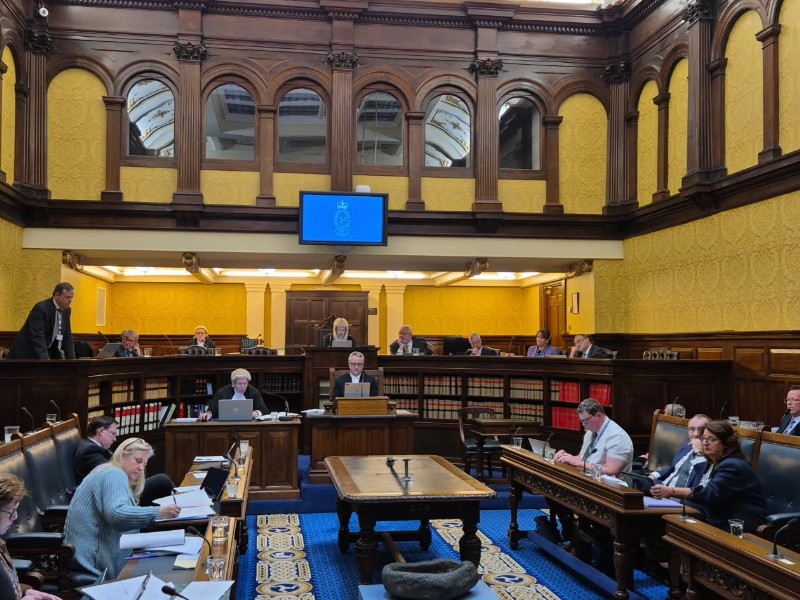
'Understand the risks and learn to manage emergencies'
Do you know a teenager or young adult living with serious allergies or at risk of anaphylaxis?
They're being invited to attend a free allergy and anaphylaxis awareness session at Keyll Darree on the Noble’s Hospital site this afternoon (Wednesday 2 July, 4:30pm – 6pm).
It will be led by Tracey Dunn, Education and AllergyWise Manager at Anaphylaxis UK, in partnership with Donna Colligon, Paediatric Nurse at Noble’s Hospital.
ANAPHYLAXIS
According to charity Anaphylaxis UK, anaphylaxis is a 'serious and often sudden allergic reaction, requiring emergency treatment'.
Any allergic reaction, including anaphylaxis, occurs when the body’s immune system wrongly identifies a food or substance as a threat.
Reactions usually begin within minutes and rapidly progress, but can occur up to 2-3 hours later.
It's estimated two million people in the UK have a food allergy of some kind.
Generally, these are attributable to 14 key allergens:
- Celery
- Cereals containing gluten
- Crustaceans
- Eggs
- Fish
- Lupin
- Milk
- Molluscs
- Mustard
- Peanuts
- Sesame
- Soybeans
- Sulphur dioxide and sulphites
- Tree nuts
There are a variety of signs and symptoms, which often vary from person to person, but the main few are often referred to the ABC's:
- AIRWAY - swelling in the throat, tongue or upper airways (tightening of the throat, hoarse voice, difficulty swallowing)
- BREATHING - sudden onset wheezing, breathing difficulty, noisy breathing
- CIRCULATION - dizziness, feeling faint, sudden sleepiness, tiredness, confusion, pale clammy skin, loss of consciousness
Other symptoms include:
- a red raised rash (known as hives or urticaria) anywhere on the body
- a tingling or itchy feeling in the mouth
- swelling of lips, face or eyes
- stomach pain or vomiting.
Many people with serious allergies are prescribed adrenaline auto-injectors (AAIs) to carry on their person.
Adrenaline acts quickly to reverse the symptoms of anaphylaxis by opening up the airways by reducing swelling and raising blood pressure.
It needs to be given as soon as possible when there are any signs of a serious allergic reaction.
Anyone who is at risk of anaphylaxis should always carry two in-date AAIs with them at all times - in case one misfires, or a second dose is needed.
AAIs are more commonly known as EpiPens or Jexts.
Both are available in adult or junior doses, and both companies produce free training devices which allow users to practice how to use the devices.
According to Anaphylaxis UK: "Adrenaline auto-injectors are designed to be used by yourself or by someone helping you.
"They are made to be easy-to-use by anyone without needing medical training, but it is still important to learn how to use them and practice often so you know what to do in an emergency.
"They are designed to be given into the middle of the outer thigh (upper leg). This can be through clothing if needed."
They add: "The position of your body is important when you suspect anaphylaxis.
"Lie down on your back with your legs raised to help the blood flow to your heart and vital organs.
"If you’re struggling to breathe you may need to be propped up, but this should be for as short a time as possible.
"Avoid any sudden change in posture. Don’t stand up or sit in a chair even if you are feeling better as this could lower your blood pressure dramatically, causing your heart to stop."
You can find out more about administrating AAIs - including visual demonstrations - HERE.
FREE SESSION
Today's session was made possible thanks to the support of the Greenhalgh family and Hartford Homes, following the 2024 New Year’s Dip fundraiser.
The money raised by the family for Anaphylaxis UK has funded several training sessions in various settings.
This afternoon's session at Keyll Darree will focus on teenagers and young adults.
It's designed to help them understand their allergy and anaphylaxis risks; learn how to manage emergencies confidently and ask questions and share experiences in a safe space.
Siobhán Fletcher caught up with the pair to find out more:
Spaces for today's session are limited to 30 attendees, so booking is essential!
To secure your place, email: donna.colligon@gov.im
Attendees are welcome to bring a family member or friend for support.
For more information on serious allergies and anaphylaxis, visit Anaphylaxis UK's website HERE.
You can hear more of Siobhán's chat with Donna and Tracey in our latest Newscast, available now:

 Tynwald rejects proposed referendum on the Island’s net-zero policy after extensive debate
Tynwald rejects proposed referendum on the Island’s net-zero policy after extensive debate
 Are Manx people happy?
Are Manx people happy?
 Tonight's Heysham sailing cancelled
Tonight's Heysham sailing cancelled
 Plans to progress waste disposal facility near Ronaldsway outlined
Plans to progress waste disposal facility near Ronaldsway outlined
 Emergency Road closure to remove dangerous tree
Emergency Road closure to remove dangerous tree